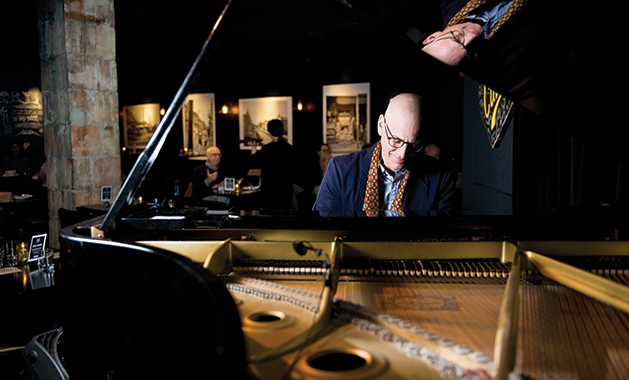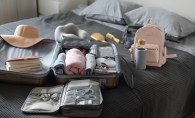
A huddle of New Yorkers descends narrow steps into a basement jazz club—toward trumpet honks and piano-key trickles.
Intimidated by highbrow, big-city culture, they at last decompress their shoulders after finding the space welcoming. It’s a bit of a reverse experience in Saint Paul. Speakeasy/jazz club Vieux Carré (view kah-ray) tucks down into a plaza on Seventh Place where the Artists’ Quarter jazz club used to be. This is not a crushed, standing-room situation; you take a seat at a sleek black, candlelit table. You can converse audibly. Musicians take the stage without anyone turning down the lights. Tables come right up to the piano. Describing the club’s approachable atmosphere, “I’m not going to say ‘Minnesota nice,’” jazz pianist Jeremy Walker says. “But it is pretty unassuming.” The surprise, then, might be that this is still, indeed, “big-city culture.”
Vieux Carré, meaning “old square” and referring to the French Quarter in New Orleans, opened about two years ago after the owners of the Dakota Jazz Club realized this basement space, occupied by the Artists’ Quarter until 1990, could make a more intimate alternative to the Dakota. It’s essentially a cocktail bar centered on
a piano. And nothing’s more intimate than the kitchen. Unable to insert a vent thanks to the historic quality of the building, executive chef Derik Moran somehow crafts gourmet, New Orleans-inspired dishes, such as the fried catfish po’ boy ($16) and the oysters Rockefeller ($5), without a stove. He uses the sous-vide method of cooking—vacuum-sealing ingredients in plastic and cooking them in boiling water. He also uses an induction cooker and a hot-air steamer.
The New Orleans motif recognizes co-owner Lowell Pickett’s love for the city. Poster-size black-and-white photos, some over a century old, capture scenes of Southern urban life. One depicts Mardi Gras: countless people packing a thoroughfare, every single one wearing a bourgeois hat.
On the cocktail menu, the signature barrel-aged Vieux Carré ($11) mixes Bulleit rye, cognac, Benedictine, sweet vermouth and Peychaud’s Angostura for a New Orleans take on a Manhattan—with an extra kick from the rye.
And while the place matches that attitude with a dimly lit, speakeasy ambience, again, an air of calm makes any Mardi Gras conviviality feel distant.
Rather, it’s the type of place where saxophonist Ted Nash could join longtime friend Walker onstage—without publicity, extemporizing through friends’ shared knowledge of the Great American Songbook—just a year after he won two Grammys. About half the room had caught wind. The other half, like the huddle of New Yorkers, was pleasantly surprised.
Walker performs solo—always at least one thing by Duke Ellington—every couple weeks, and once a month with his band the Songtet. The club walls, padded with a foamy material called baffling, manipulate the acoustics so you can hear every piano key clack. “It feels like playing in your own living room,” Walker says.
Another wall, without baffling and toward the front, holds bricks from the original 1970s jazz club, the Artists’ Quarter—a reminder of the comfort in consistency.









